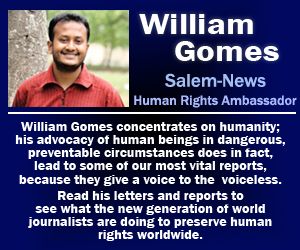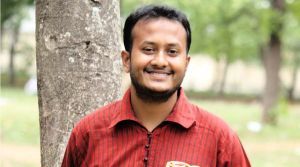
Publisher:
Bonnie King
CONTACT:
Newsroom@Salem-news.com
Advertising:
Adsales@Salem-news.com

~Truth~
~Justice~
~Peace~
TJP
Jul-17-2012 01:47

 TweetFollow @OregonNews
TweetFollow @OregonNews
Saudi Arabia: Free Editor Ra'if Badawi Held Under Cybercrime Law
Letter by William Gomes Salem-News.comBadawi had been living away from his home for months to avoid a run-in with the police.
 Ra'if Badawi Photo courtesy: frontlinedefenders.org/node/2281) |
(SALEM) - A journalist in Saudi Arabia has been targeted by authorities and arrested and charged with violating a 2007 Cybercrime law.
 |
Americans see these laws as reasonable and just because they often pertain to crimes against children and other predatory issues. But not in Saudi Arabia; in this religious nation ruled by hardcore Islamic fundamentalists, all you have to do to be charged with Cybercrime is dissent from the government.
Free speech is guaranteed by international law. However even the American politicians have no problem being allied with the Wahhabi Saudi government that heavily discriminates against women and Jewish people.
It's a big steaming bowl of contradiction soup.
One promising hope exists though in Riyadh; there have been recent changes implemented and one is the inclusion of women in the world Olympic Games. Perhaps Saudi officials can take a clue from their own progress and drop the nagging case against this popular Saudi blogger who deserves to be able to publish content that is objectionable, only then will this nation really be on a track for the future.
| “ |
I have been informed by Human Rights Watch and credible sources within Saudi Arabia that prosecutors have charged Ra’if Badawi under the 2007 Anti-Cybercrime law, alleging that his website “infringes on religious values” by providing a platform for open debate of views on religion and religious figures. According to media reports Court documents show the evidence against Badawi includes a post on the website that asks, "is God unjust?", sarcastic remarks about the Saudi religious police and a senior scholar, and a post that asks, "why is Saudi's Grand Mufti blind?" The prosecution’s evidence includes five website postings by Badawi and anonymous website members critical of Saudi religious authorities and two postings regarding theological questions, the charge sheet says. If convicted, Badawi faces up to five years in prison and a fine of up to three million Saudi Riyals (US$800,000). According to information of human rights watch, Saudi security forces stopped Badawi and arrested him on June 17, 2012, as he was driving in Jeddah, his wife and a close associate told Human Rights Watch. On the website, Badawi and others had declared May 7 a day for Saudi liberals, hoping to garner interest in open discussion about the differences between popular religion and politicized religion, said Su’ad al-Shammari, secretary general of the website. Badawi had been living away from his home for months to avoid a run-in with the police, although he did not believe he was formally wanted for arrest, Badawi told Human Rights Watch in March. On March 18, Shaikh Abd al-Rahman al-Barrak, a well-known conservative cleric, issued a religious ruling declaring Badawi an “unbeliever … and apostate who must be tried and sentenced according to what his words require.” Al-Barrak listed five pieces of what he described as evidence, such as Badawi’s alleged “claim that Muslims, Jews, Christians, and atheists are all equal,” and Badawi’s alleged “exposure of the inconveniences of the month of Ramadan.” Al-Barrak also dismissed the possibility of an open discussion of such matters, saying that even if these were not Badawi’s own opinions but an “account of the words of others, this is not allowed unless accompanied by a repudiation” of such words. Saudi authorities have long harassed Badawi with politically motivated prosecutions for his debate of religious views, Human Rights Watch said. In March 2008, prosecutors arrested and detained Badawi for questioning, also for setting up his website, but released him after one day. Badawi left the country after being formally charged in May 2008. He returned when prosecutors apparently decided not to pursue his case, he told Human Rights Watch. Nevertheless, as a result of the charges, the government in 2009 barred Badawi from foreign travel and froze his business interests, depriving him of a source of income, he told Human Rights Watch. Badawi had told Human Rights Watch that since al-Barrak’s March religious ruling, he feared for his life and for the lives of his family. His father and a brother have publicly distanced themselves from him and declared him an unbeliever. The charge sheet names his father as having initiated the legal action against Badawi, also including a charge of “filial disobedience,” although no instances of such disobedience are included in the charge sheet. A person close to Badawi told Human Rights Watch that Badawi has not seen his father in years. Members of Badawi’s wife’s family also began agitating against him, Badawi told Human Rights Watch, leading his wife and three children to leave the country. Badawi had learned that his wife’s relatives were filing suit in a Jeddah court to have him forcibly divorced from his wife as an apostate, and thus not allowed to marry a Muslim woman under Islamic law. His wife and children remain abroad. International human rights law protects the right to freedom of expression. International standards only allow content-based restrictions in extremely narrow circumstances, such as cases of slander or libel against private individuals or speech that threatens national security. Restrictions must be clearly defined, specific, necessary, and proportionate to the threat to the interest protected. The mere fact that forms of expression are considered to be insulting to a public figure is not sufficient to justify the imposition of penalties, the UN Human Rights Committee said in its 2011 General Comment No. 34 regarding permissible limits on freedom of expression. Regarding restrictions for the protection of public morals, the committee in its 1993 General Comment No. 22 on freedom of religion observed “that the concept of morals derives from many social, philosophical and religious traditions; consequently, limitations... for the purpose of protecting morals must be based on principles not deriving exclusively from a single tradition.” I urge you to immediately release editor Ra'if Badawi held under Cybercrime Law and ensure freedom of expression in Saudi Arabia. |
” |

Salem-News.com Human Rights Ambassador William Nicholas Gomes is a Bangladeshi journalist, human rights activist and author was born on 25 December, 1985 in Dhaka. As an investigative journalist he wrote widely for leading European and Asian media outlets.
He is also active in advocating for free and independent media and journalists’ rights, and is part of the free media movement, Global Independent Media Center – an activist media network for the creation of radical, accurate, and passionate telling of the truth. He worked for Italian news agency Asianews.it from year 2009 to 2011, on that time he was accredited as a free lance journalist by the press information department of Bangladesh. During this time he has reported a notable numbers of reports for the news agency which were translated into Chinese and Italian and quoted by notable number of new outlets all over the world.He, ideologically, identifies himself deeply attached with anarchism. His political views are often characterized as “leftist” or “left-wing,” and he has described himself as an individualist anarchist.
Salem-News.com seeks:
-Investors
-Ad Sales
-Donations
-Volunteers
Since 2004, 24k articles; writers, 23 countries
 |
 |
 |
 |
 |
 |
 |
Articles for July 16, 2012 | Articles for July 17, 2012 | Articles for July 18, 2012
Quick Links
DINING
Willamette UniversityGoudy Commons Cafe
Dine on the Queen
Willamette Queen Sternwheeler
MUST SEE SALEM
Oregon Capitol ToursCapitol History Gateway
Willamette River Ride
Willamette Queen Sternwheeler
Historic Home Tours:
Deepwood Museum
The Bush House
Gaiety Hollow Garden
AUCTIONS - APPRAISALS
Auction Masters & AppraisalsCONSTRUCTION SERVICES
Roofing and ContractingSheridan, Ore.
ONLINE SHOPPING
Special Occasion DressesAdvertise with Salem-News
Contact:AdSales@Salem-News.com

googlec507860f6901db00.html



Terms of Service | Privacy Policy
All comments and messages are approved by people and self promotional links or unacceptable comments are denied.
[Return to Top]
©2025 Salem-News.com. All opinions expressed in this article are those of the author and do not necessarily reflect those of Salem-News.com.